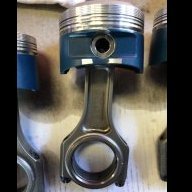Rb26 Rev Limit
Announcements
-
Similar Content
-
Latest Posts
-
By TurboTapin · Posted
Got the motor out and torn down. I'll be dropping off the block Monday. Luckily the scoring on Cyl6 is much less pronounced then the pictures made it out to seem. It can barely be felt. If you pass your finger over it 10x you'll barely notice it. Hopefully by some chance it will only require a honing. I'm not in the mood to buy one size larger pistons or another block. Oddly enough my 6th cylinder with the scoring has extremely clean intake valves compared to my other 5 cylinders. I'm worried the scoring was caused by too much fuel or Water/Methanol washing the cylinder. I'll review some old logs to confirm. This was also the first time I pull an engine with the transmission still attached. It went much better then expected. I was worried my CD009 wouldn't make it easy due to its sheer size but it was much easier this way. -
By joshuaho96 · Posted
From the pictures I have when doing the job the flywheel is the same diameter, I don't think they're playing weird tricks like putting weights at the outer diameter to increase flywheel inertia or anything like that. The OEM flywheel is definitely heavier, but it's not a huge difference. Quoted weight savings of the clutch is 2 kg so I can't imagine the flywheel being lighter than ~7 kg. Kind of regret not weighing it before the clutch went into the car but as far as driveability goes I have no complaints. -
By joshuaho96 · Posted
HKS trigger kit should be very easy to integrate with a Link. It's a 36-2 crank trigger. Hard part is finding the motivation to take off the timing belt and everything on the front of the engine to install it. You also need to cut out a hole in the oil pump housing so the sensor can read the trigger wheel. Changing out the cam sensor for a 24 tooth setup is probably good enough but as others have mentioned depending on what underlying assumptions are changed it becomes more of a problem. Reading the crank state off of the cam is an abstraction that works in the general case, but if you have an edge case it makes less and less sense. There is a GTX2860 gen 2 that can take a compact 5 bolt housing so it's direct bolt on but I'm not 100% sure of what's involved. Peak compressor efficiency drops off a bit on these turbos vs -5s, 77% vs 73% but you get way, way wider region of operation. The -5s have a really strange surge line in their compressor map that is all over the place. If you think the hot side on the -5s aren't open enough you can try the Tomei T550B turbos which a local tuner seems to be happy with: -
i need a complete tail light for my R33 GTR if you have please let me know.
-





Recommended Posts
Create an account or sign in to comment
You need to be a member in order to leave a comment
Create an account
Sign up for a new account in our community. It's easy!
Register a new accountSign in
Already have an account? Sign in here.
Sign In Now